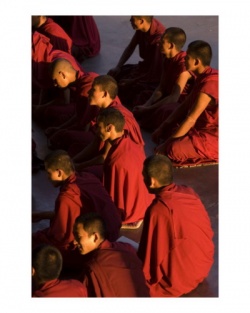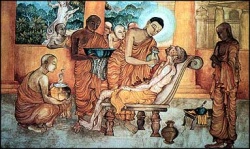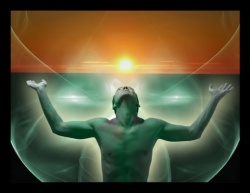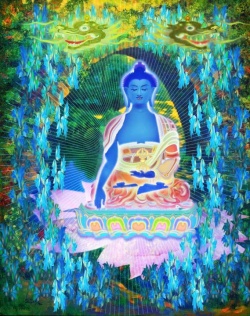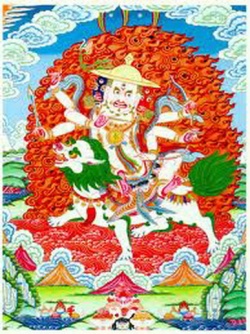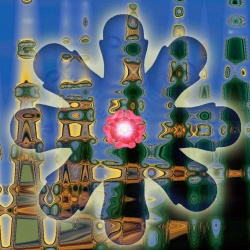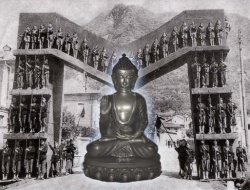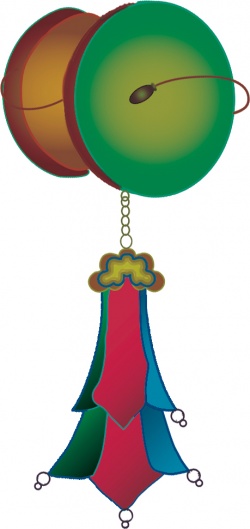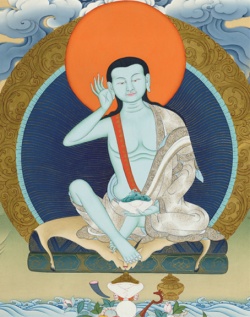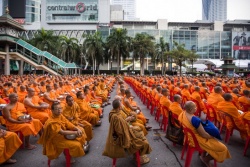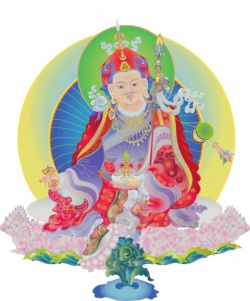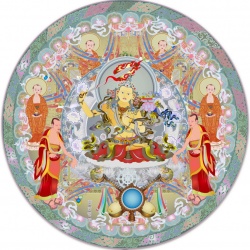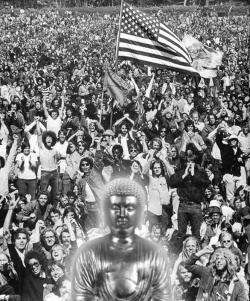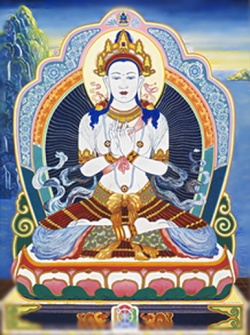Difference between revisions of "The Realms of Consciousness"
(Created page with " <poem> "Your constant utilization of thought to give continuity to your separate self is 'you'. There is nothing there inside you other than that." — U.G....") |
|||
| Line 1: | Line 1: | ||
| + | <nomobile>{{DisplayImages|3889|2112|203|829|3578|1768|4381|1816|4288|2061|373|1825|1186|3234|2606|280|222|3145|2850|2350|1071|1489|3886|1967|263}}</nomobile> | ||
| + | |||
| + | |||
| Line 5: | Line 8: | ||
<poem> | <poem> | ||
| − | "Your [[constant]] utilization of [[thought]] to give continuity to your separate [[self]] is 'you'. There is nothing there inside you other than that." — U.G. [[Wikipedia:Jiddu Krishnamurti|Krishnamurti]] | + | "Your [[constant]] utilization of [[thought]] to give continuity to your separate [[self]] is 'you'. |
| + | |||
| + | There is nothing there inside you other than that." — U.G. [[Wikipedia:Jiddu Krishnamurti|Krishnamurti]] | ||
| + | |||
| + | "Some [[people]] believe we are something beyond {{Wiki|neurons}}, but of course we are not. We are just the sum total of the [[activity]] of {{Wiki|neurons}}. | ||
| + | |||
| + | We assume that we have [[free will]] and that we make decisions, but we don't. {{Wiki|Neurons}} do." — Rodolfo Llinás, {{Wiki|neuroscientist}} | ||
| + | |||
| + | |||
| + | |||
| + | [[Ancient]] [[Hindu]] [[yogis]] and [[Tibetan Buddhist]] [[monks]] categorized seven stages of [[human]] [[consciousness]], and referred to them as the "seven [[bodies]]." | ||
| + | |||
| + | I would like to describe these "[[bodies]]" as [[realms]] of [[consciousness]] because I [[feel]] the {{Wiki|evidence}} strongly suggests that they are all stages of [[awareness]] in the purely [[physical]] [[human]] {{Wiki|brain}}. | ||
| + | |||
| + | This is my opinion, and {{Wiki|traditionalists}} may disagree, so be {{Wiki|aware}} that you are reading one man's [[views]] of [[ancient teaching]]. | ||
| + | |||
| + | I am trying to bring [[science]] and the Eastern [[traditions]] into [[harmony]] in order to express the actual facts rather than just restating [[ancient]] [[myths]]. | ||
| + | |||
| + | This [[marriage]] of [[science]] and [[meditative]] [[states of consciousness]] may be awkward at first as the combination is very new. | ||
| + | |||
| + | |||
| + | |||
| + | All should be {{Wiki|aware}} that an overly serious [[discussion]] of [[higher realms]] of [[consciousness]] can lead to a [[form]] of pseudo-spiritual fascism. | ||
| + | |||
| + | Fixation with categorizing different levels of [[consciousness]] tarnished the image of the [[Theosophical]] {{Wiki|movement}} in the early 20th century, as it led to a [[foolish]] competition among members. | ||
| + | |||
| + | A few [[Wikipedia:Theosophy|Theosophists]] claimed to be on a higher level of [[consciousness]] than the rest of the group, and felt this made them {{Wiki|superior}} and of greater value as [[human beings]]. | ||
| + | |||
| + | |||
| + | |||
| + | Ultimately, [[human]] worth is [[subjective]] and rests, like [[beauty]], in the [[eye]] of the beholder. | ||
| + | |||
| + | Who is to say that even a [[Buddha]] is better than your wife, son, or daughter? | ||
| + | |||
| + | Those you [[love]] most are of [[highest]] value to you, not some far away [[yogi]] or [[monk]]. | ||
| + | |||
| + | No real or [[imagined]] {{Wiki|hierarchy}} of [[beings]] on higher levels of [[consciousness]] are of importance unless you make them important. | ||
| + | |||
| + | [[Full enlightenment]] and three dollars will buy you a cup of coffee and a jelly doughnut at almost any diner in [[America]]. | ||
| + | |||
| + | |||
| + | |||
| + | The [[traditional]] Eastern descriptions of seven [[bodies]] of [[consciousness]] are derived from [[subjective]] [[feeling]], not from [[objective]] testing. | ||
| + | |||
| + | It is therefore advised that you take these descriptions as [[subjective]] [[states of consciousness]], not as proven [[physical]] [[science]]. | ||
| + | |||
| + | The [[human]] {{Wiki|brain}} contains approximately 100 billions {{Wiki|neurons}}, all connected by an estimated 50 trillion {{Wiki|synapses}}. | ||
| + | |||
| + | This ocean of electrified living {{Wiki|cells}} creates the organic holographic [[phenomena]] we know as [[consciousness]]. | ||
| + | |||
| + | The amount of variation in [[human]] [[consciousness]] is almost [[infinite]] because all those {{Wiki|neurons}} and {{Wiki|synapses}} can [[fire]] in an [[essentially]] [[infinite]] number of sequences. | ||
| + | |||
| + | No two [[humans]] have exactly the same {{Wiki|brain}} {{Wiki|structure}}, and no two moments in any individual's [[consciousness]] are ever exactly the same. | ||
| + | |||
| + | The words of {{Wiki|Greek}} [[philosopher]] {{Wiki|Heraclitus}} are often paraphrased as saying that "You can never step in the same [[river]] twice." | ||
| + | |||
| + | A more exacting translation of his words would be "We both step and do not step in the same [[rivers]]. | ||
| + | |||
| + | We are and are not." | ||
| + | |||
| + | |||
| + | |||
| + | How is it possible to know oneself objectively and thus accurately? For example, subjectively your {{Wiki|dog}} may know your automobile very well. | ||
| + | |||
| + | He may have ridden in your car, smelled it, felt it, and seen it as clearly as you, but does that mean that your {{Wiki|dog}} really [[understands]] what an automobile is? | ||
| + | |||
| + | Likewise, just because you may be able to [[feel]] different levels of [[consciousness]] does not mean that you understand the [[true nature]] of [[consciousness]] in an [[objective]], {{Wiki|factual}} way. | ||
| + | |||
| + | |||
| + | Can we [[trust]] [[ancient]] [[scriptures]] from the prescientific {{Wiki|era}} to tell us the [[truth]]? Do the famous and often infamous "[[enlightened ones]]" have all the answers about man's inner [[nature]]? | ||
| + | |||
| + | I do not believe even the words of the great "[[Masters]]" can be trusted on these issues, because history has proven that the [[enlightened]] {{Wiki|elite}} can make major mistakes, just like you and me. | ||
| + | |||
| + | Even the [[enlightened]] are [[subject]] to {{Wiki|cultural}} {{Wiki|conditioning}} which can distort their [[vision]] and [[judgment]]. | ||
| + | |||
| + | For example, the famous [[Tibetan]], {{Wiki|Chinese}}, and [[Japanese]] [[sages]] mainly ate meat, as was the {{Wiki|custom}} in their countries. | ||
| + | |||
| + | The [[Indian]] [[mystics]], however, are all adamantly [[vegetarian]], as is their strict [[Hindu]] and [[Jain]] {{Wiki|culture}}. | ||
| + | |||
| + | Societal programming does affect the [[enlightened]], and thus they may attach false [[beliefs]] to their teachings which they pass on to you as fact. | ||
| + | |||
| + | If their {{Wiki|culture}} believes in [[souls]] and [[reincarnation]], they may believe the same out of lifelong {{Wiki|conditioning}}. | ||
| + | |||
| + | Unfortunately, the very real [[phenomenon]] of [[enlightenment]] does not endow infallible [[wisdom]]. It is with these warnings that we enter the intriguing [[world]] of the [[realms]] of [[consciousness]]. | ||
| + | |||
| + | |||
| + | |||
| + | 1) The [[Physical Realm]] - The first [[realm]] is simple [[awareness]] of the [[physical world]] and the grossly material [[physical body]] which {{Wiki|medical}} [[science]] continues to map and explore. | ||
| + | |||
| + | Those who reside primarily in the [[first realm of consciousness]] are concerned with the simple basics of [[life]]: [[food]], [[shelter]], and [[family]]. | ||
| + | |||
| + | They may believe in organized [[religions]], but they lack deep involvement in anything beyond the fundamentals of [[physical existence]]. | ||
| + | |||
| + | |||
| + | |||
| + | |||
| + | 2) The {{LTSW|Energy Realm}}[[Energy Realm]] - In addition to the solid [[physical body]] that has {{Wiki|weight}} and [[form]], [[human beings]] have a second [[body of energy]] created by the active [[energy]] content of the total [[human]] {{Wiki|nervous system}}. | ||
| + | |||
| + | This second [[realm]] has been called the etheric, energetic, or [[emotional]] [[body]], which is powered by our [[own]] [[animal]] [[metabolism]]. | ||
| + | |||
| + | More {{Wiki|subtle}} layers of the [[human]] {{Wiki|nervous system}} may [[exist]] that are not yet understood by [[Western]] [[science]]. | ||
| + | |||
| + | For example, [[Western]] [[doctors]] have no explanation for what creates the [[sensation]] of the mysterious "[[meridians]]" ([[channels of energy]]) which are activated by {{Wiki|acupuncture}}, even though those [[meridians]] can be clearly felt by many patients. | ||
| + | |||
| + | The second [[realm]] can be energized by [[deep breathing]], [[yoga postures]], jogging, and [[good health]] in general. | ||
| + | |||
| + | Those who live in the second [[realm]] have enough [[Wikipedia:cognition|cognitive]] power to [[feel]] the inner workings of the [[human]] {{Wiki|nervous system}}. | ||
| + | |||
| + | |||
| + | |||
| + | Most [[human beings]] primarily reside in the second [[realm of consciousness]], and they create the majority of our {{Wiki|culture}}, [[art]], {{Wiki|politics}}, and organized [[religion]]. | ||
| + | |||
| + | The second [[realm]] is not [[meditative]], but is richly and complexly [[emotional]]. | ||
| + | |||
| + | No actor could develop great "[[emotional]] range" unless he was at least a [[conscious]] resident of the second [[realm]]. | ||
| + | |||
| + | |||
| + | This ranking of [[realms]] implies no overall {{Wiki|superiority}} of [[human]] worth. | ||
| + | |||
| + | A [[person]] who [[lives]] in the first [[realm]] may be good hearted and hard working, while a second [[realm]] {{Wiki|individual}} may be a thief, {{Wiki|drug}} addict, and murderer. | ||
| + | |||
| + | [[Imagine]] the [[Earth]] viewed from the {{Wiki|perspective}} of deep [[space]], the thin layer of our "[[humanity]]" barely [[visible]] as a dulling of the [[earth's]] {{Wiki|atmosphere}} due to the pollution we create. | ||
| + | |||
| + | Who can [[judge]] any [[human]] worth from the eternal [[cosmic]] {{Wiki|perspective}}? | ||
| + | |||
| + | |||
| + | |||
| + | 3) The {{LTSW|Enhanced Mental Realm}}[[Enhanced Mental Realm]] - The third [[realm]], sometimes called the "[[astral body]]," is the first [[realm]] of [[meditation]]. I reject the "[[astral]]" label as both dishonest and inaccurate. | ||
| + | |||
| + | I would prefer to call the third [[realm]] the [[enhanced mental realm]]. | ||
| + | |||
| + | When you sit in [[meditation]] and start to [[feel]] bigger than the purely [[physical]], that is the third [[realm]] revealing itself. | ||
| + | |||
| + | It is colorful and [[pleasant]], but fairly low in [[energy]]. | ||
| + | |||
| + | Entering the third [[realm]] means that you have gained some progress in [[meditation]], either through formal practice in [[meditation]] techniques, or through the {{Wiki|genetic}} [[gift]] of a naturally [[meditative]] [[mind]]-[[brain]] from [[birth]]. | ||
| + | |||
| + | Those who reside in the third [[realm]] have good skills of observation and a knack for [[letting go]] of the [[thought]] process. | ||
| + | |||
| + | |||
| + | |||
| + | |||
| + | [[Consciousness]] is a continuously variable [[phenomena]], and is thus always changing in size and intensity. | ||
| + | |||
| + | |||
| + | When one says that a [[person]] is in the third [[realm]] of [[consciousness]], it means that is where he or she resides most of the time during the day when wide awake. | ||
| + | |||
| + | We all lose [[consciousness]] at night while [[sleeping]], and that includes the so-called "[[enlightened]]." | ||
| + | |||
| + | [[Consciousness]] fluctuates up and down, burning brighter or becoming dimmer when one is tired or less attentive. | ||
| + | |||
| + | Those who primarily reside in the third [[realm]] have frequent jaunts into the fourth, but may also fall back into the second [[realm]] when their [[awareness]] is less activate. | ||
| + | |||
| + | Those students who primarily reside in the fourth have frequent excursions into the fifth [[realm]] of [[consciousness]], which is called a '[[satori]].' | ||
| + | |||
| + | Even those in the third [[realm]] may sometimes jump up temporarily to the fifth for a glimpse of freedom. | ||
| + | |||
| + | These glimpses may be [[initiated]] by intense [[practice of meditation]] techniques, or triggered by close proximity to a [[teacher]] who resides in the [[higher realms]]. | ||
| + | |||
| + | You can call this [[transference]] [[direct transmission]], [[shaktipat]], or simply a "[[contact]] high." | ||
| + | |||
| + | |||
| + | |||
| + | The vast majority of [[people]] who practice [[meditation]] live in the second or third [[realms]], but you would be surprised at the number of letters I receive from {{Wiki|novice}} students who automatically assume they are in the fifth [[realm]] or even higher. | ||
| + | |||
| + | Many are in a [[blind]] rush to become [[enlightened]] and naively think they can achieve the [[Wikipedia:Absolute (philosophy)|ultimate]] after a few short years of practice. | ||
| + | |||
| + | It is a common mistake to believe that [[intellectual]] [[knowledge]] about [[enlightenment]] is {{Wiki|equivalent}} to [[enlightenment]] itself. | ||
| + | |||
| + | The [[Indian]] [[Wikipedia:Sage (sophos|sage]] [[Ramana Maharshi]] once said that [[enlightenment]] was an "unlearning," not a {{Wiki|learning}}. [[Meditation]] is a knack, an [[energy]] [[phenomena]] of the {{Wiki|brain}} and [[consciousness]]. | ||
| + | |||
| + | It is not an [[accumulation]] of borrowed [[wisdom]] dumped, like a landfill, into the [[thinking]] part of the {{Wiki|brain}}. | ||
| + | |||
| + | One must develop [[patience]] in order to make progress in [[meditation]]. | ||
| + | |||
| + | |||
| + | |||
| + | 4) The {{LTSW|Super-Mental Realm}}[[Super-Mental Realm]] - The [[fourth realm]] has been called the "[[mental body]]," and [[feels]] much larger than the third. I would prefer to call the [[fourth realm]] the [[super-mental realm]]. | ||
| + | |||
| + | Subjectively, the fourth [[feels]] oceanic, and is filled with more intense [[energy]] and {{Wiki|light}}. | ||
| + | |||
| + | The fourth is highly protective and is the instrument of clarity, [[imagination]], and vivid [[dreams]]. | ||
| + | |||
| + | Many great {{Wiki|artists}} have been [[awakened]] to the [[fourth realm]] and drew inspiration and [[energy]] from its depths. Frank Lloyd Wright and Andrew Wyeth are obvious examples of [[fourth realm]] {{Wiki|artists}}. | ||
| + | |||
| + | |||
| + | Those who reach the [[fourth realm]] often [[imagine]] they are [[enlightened]] and become even more [[arrogant]] and [[selfish]] than they were before [[attaining]] it. | ||
| + | |||
| + | Most [[Indian]] and [[Tibetan]] [[gurus]] and contemporary [[Japanese]] "[[Zen]] [[Masters]]" are in this [[fourth realm]], and that is why most are not very helpful to their [[own]] students. | ||
| + | |||
| + | The potential for [[ego]] inflation is difficult to resist, but can be fought off by remembering that the fourth is relatively easy to attain and there are thousands of mid-level [[fourth realm]] students in the [[world]] at any given time. | ||
| + | |||
| + | The fourth can be achieved through the use of [[Wikipedia:scientific method|methodology]] if a [[student]] makes a {{Wiki|sincere}} [[effort]] over a long period of time. | ||
| + | |||
| + | While there is nothing historically unusual about entering this expanded [[state of consciousness]], it does take us one step closer to true wakefulness. | ||
| + | |||
| + | |||
| + | In this more [[science]] friendly system of defining the [[realms]] of [[consciousness]], there is no "[[soul]] [[body]]," as the ancients have suggested. | ||
| + | |||
| + | By this [[definition]] if you have not yet reached the [[Void]] on a [[permanent]] basis, you are still in one of the [[mental states]] of [[consciousness]]. | ||
| + | |||
| + | This system also discards any [[idea]] of "[[moksha]]" (freedom from [[reincarnation]]), because it rejects the premise that [[souls]] and [[reincarnation]] [[exist]]. | ||
| + | |||
| + | Thus, there are only five [[realms]] of [[consciousness]] described in detail here, which I believe reflects the honest facts. | ||
| + | |||
| + | |||
| + | |||
| + | |||
| + | 5) The {{LTSW|Realm Of Enlightenment}}[[Realm Of Enlightenment]] - Those who go beyond the [[fourth realm]] permanently are born with a rare {{Wiki|genetic}} [[gift]] of naturally greater [[consciousness]]. | ||
| + | |||
| + | |||
| + | |||
| + | The fifth [[realm]] of [[consciousness]], in my opinion, cannot be reached by [[effort]] alone. | ||
| + | |||
| + | Living in the fifth [[realm]] as a [[permanent]] resident, not just as a temporary guest, is the truly difficult task for students of [[meditation]]. | ||
| + | |||
| + | To reach the fifth one must journey upwards, not just outwards, and this higher plane facilitates a continuous [[state]] of superconsciousness. The fourth can be described as an ocean of {{Wiki|light}} that is highly projective. | ||
| + | |||
| + | |||
| + | The fifth [[realm]] is non-projective and is beyond the ocean of {{Wiki|light}}, beyond the [[thought]] process, and beyond the [[human]] [[mind]]. | ||
| + | |||
| + | Subjectively, the fifth [[feels]] like an [[infinity]] of warm and comfortable {{Wiki|darkness}} that softly envelopes the [[mind]] ocean. | ||
| + | |||
| + | To put it in other terms, in the [[fourth realm]] you [[feel]] like a ball of [[consciousness]] floating in the depth of [[space]]. When entering the fifth [[realm]], you literally [[feel]] that you are the depth of [[space]] itself, the [[Void]]. | ||
| + | |||
| + | When you remain in the 5th [[realm]] permanently, you are [[enlightened]], a [[Buddha]]. | ||
| + | |||
| + | |||
| + | |||
| + | A glimpse of the fifth is called a [[satori]], a temporary peak at [[enlightenment]]. | ||
| + | |||
| + | Many students confuse the blissfulness of the third and fourth [[realms]] they [[experience]] during [[meditation]] sessions with [[satori]], which is a deeper [[phenomena]]. | ||
| + | |||
| + | Even to [[experience]] an [[Wikipedia:Authenticity|authentic]] [[satori]] is relatively easy. | ||
| + | |||
| + | To live in [[satori]], the fifth [[realm]], is relatively impossible. It is almost like the difference between visiting Hawaii and actually owning Hawaii. | ||
| − | + | The fifth [[realm]] is the only truly comfortable level of [[consciousness]] where one finally [[feels]] at home. | |
| − | + | Until the fifth is [[attained]], we live as strangers to ourselves because we have not yet come home to our [[own]] [[essential]] being. Until the fifth we do not know our "original face," and thus we [[suffer]]. | |
| − | |||
| − | |||
| − | + | In my opinion, the [[bodies]] or [[realms]] above the fifth are fictional and do not [[exist]] as separate, definable stages of [[consciousness]]. | |
| − | + | I would categorize all [[enlightened]] [[teachers]] as residing permanently in the fifth [[realm]], with some having a little greater [[psychic energy]] output than others, but I [[doubt]] this slight edge endows greater potential for [[insight]] and [[wisdom]]. | |
| − | + | [[Enlightenment]] is a [[physical phenomenon]] of the [[human]] {{Wiki|brain}}, not a fairy tale product of [[magic]], so variations in its [[manifestations]] are to be expected. | |
| − | + | Differences in the expression of [[enlightenment]] may be due to the genetics of internal {{Wiki|brain}} structures, {{Wiki|brain}} {{Wiki|chemistry}}, or even {{Wiki|brain}} size. | |
| − | + | No two {{Wiki|brains}} are the same, and as stated earlier, no two moments in anyone's [[consciousness]] are ever exactly the same due to the incredibly large numbers of {{Wiki|neurons}} and {{Wiki|synapses}} the [[human]] {{Wiki|brain}} contains. | |
| − | |||
| − | |||
| − | + | Claims made by some [[gurus]] that higher levels of [[consciousness]] make one capable of time travel are false. | |
| − | + | All of the stages of [[consciousness]] and all of [[life]] [[exists]] in the here and now. | |
| − | + | Even a full [[Buddha]] is not capable of [[seeing]] into the {{Wiki|future}} in any [[magical]] way beyond ordinary reasonable guesses. Unfortunately, there is much self-promotion in the [[world]] of [[gurus]] which often leads to [[exaggeration]]. | |
| − | + | Likewise, such often claimed [[powers]] as the ability to materialize {{Wiki|matter}} and the [[attainment]] of an {{Wiki|all-seeing}}, infallible [[wisdom]] are equally fictitious. | |
| − | + | [[Human beings]] in the [[fourth realm]] and beyond often do have [[Wikipedia:Authenticity|authentic]] [[powers]] of rudimentary {{Wiki|telepathy}} and direct [[energy]] [[transmission]] ([[shaktipat]]). | |
| − | |||
| − | |||
| − | + | 6) The "sixth [[body]]" has been called the "[[cosmic body]]" by the ancients, but that term describes the fifth [[realm]] equally well, so I reject the [[assertion]] that there is a {{Wiki|distinct}} sixth [[body]]. | |
| − | + | The fifth [[realm]] is the [[Void]], and you cannot go beyond it because that is all there is. | |
| − | + | In my opinion, stories of [[bodies]] beyond the fifth are born of [[spiritual]] {{Wiki|politics}} and oneupmanship. | |
| + | |||
| + | These [[myths]] are passed down from one generation of [[gurus]] to the next, and no one questions the [[myths]] because the [[East]] is in [[love]] with [[tradition]] and all that is [[ancient]]. | ||
| + | |||
| + | |||
| + | |||
| + | 7) The "seventh [[body]]" is referred to as "[[nirvana]]" or "[[moksha]]," and those who achieve it are said to gain the [[Wikipedia:Absolute (philosophy)|ultimate]] [[spiritual]] freedom, which includes freedom from cycles of [[rebirth]] through [[reincarnation]]. | ||
| + | |||
| + | In my opinion, all of the [[objective]] {{Wiki|evidence}} suggests that there is no [[reincarnation]], no seventh stage, no seventh [[realm]], and no seventh [[body]]. | ||
| + | |||
| + | [[Humans]] have had a fascination with the [[magical]] number 'seven' for centuries, and the [[idea]] of seven [[bodies]] has great sales potential for [[gurus]], even if it is [[pure]] {{Wiki|fiction}}. | ||
| − | |||
| − | |||
Christopher Calder Note* Christopher Calder's website no longer [[exists]]. His {{Wiki|essays}} are archived here. | Christopher Calder Note* Christopher Calder's website no longer [[exists]]. His {{Wiki|essays}} are archived here. | ||
| − | |||
| − | Note Opinions expressed on this page must be viewed as the [[ideas]] of an ordinary [[student]] of [[meditation]]. While I truly believe everything I say, you should not believe anything unless you see it, [[feel]] it, and know it for yourself. I make no claims of infallibility. In fact, I absolutely claim fallibility. Also, this author [[suffers]] from dyslexia. If you find any spelling or punctuation mistakes in any of my {{Wiki|essays}}, please let me know. | + | Copyright notice: Please [[feel]] free to copy, repost, or publish The [[Realms]] of [[Consciousness]] (© 1999 Christopher Calder) for educational, noncommercial use. |
| + | |||
| + | You may repost or publish any of my {{Wiki|essays}} without cost, but you must clearly [[state]] that the {{Wiki|essays}} were written by Christopher Calder, you must not change any of my words or their meanings, and no one has been granted permission to use my writings to sell any products or services. | ||
| + | |||
| + | This is a 100% free website, published only for the [[benefit]] of other students of [[meditation]]. | ||
| + | |||
| + | |||
| + | |||
| + | Note Opinions expressed on this page must be viewed as the [[ideas]] of an ordinary [[student]] of [[meditation]]. While I truly believe everything I say, you should not believe anything unless you see it, [[feel]] it, and know it for yourself. | ||
| + | |||
| + | I make no claims of infallibility. In fact, I absolutely claim fallibility. | ||
| + | |||
| + | Also, this author [[suffers]] from dyslexia. If you find any spelling or punctuation mistakes in any of my {{Wiki|essays}}, please let me know. | ||
</poem> | </poem> | ||
{{R}} | {{R}} | ||
http://meditation-handbook.50webs.com/realms2.html | http://meditation-handbook.50webs.com/realms2.html | ||
[[Category:]] | [[Category:]] | ||
Revision as of 18:10, 22 November 2015
"Your constant utilization of thought to give continuity to your separate self is 'you'.
There is nothing there inside you other than that." — U.G. Krishnamurti
"Some people believe we are something beyond neurons, but of course we are not. We are just the sum total of the activity of neurons.
We assume that we have free will and that we make decisions, but we don't. Neurons do." — Rodolfo Llinás, neuroscientist
Ancient Hindu yogis and Tibetan Buddhist monks categorized seven stages of human consciousness, and referred to them as the "seven bodies."
I would like to describe these "bodies" as realms of consciousness because I feel the evidence strongly suggests that they are all stages of awareness in the purely physical human brain.
This is my opinion, and traditionalists may disagree, so be aware that you are reading one man's views of ancient teaching.
I am trying to bring science and the Eastern traditions into harmony in order to express the actual facts rather than just restating ancient myths.
This marriage of science and meditative states of consciousness may be awkward at first as the combination is very new.
All should be aware that an overly serious discussion of higher realms of consciousness can lead to a form of pseudo-spiritual fascism.
Fixation with categorizing different levels of consciousness tarnished the image of the Theosophical movement in the early 20th century, as it led to a foolish competition among members.
A few Theosophists claimed to be on a higher level of consciousness than the rest of the group, and felt this made them superior and of greater value as human beings.
Ultimately, human worth is subjective and rests, like beauty, in the eye of the beholder.
Who is to say that even a Buddha is better than your wife, son, or daughter?
Those you love most are of highest value to you, not some far away yogi or monk.
No real or imagined hierarchy of beings on higher levels of consciousness are of importance unless you make them important.
Full enlightenment and three dollars will buy you a cup of coffee and a jelly doughnut at almost any diner in America.
The traditional Eastern descriptions of seven bodies of consciousness are derived from subjective feeling, not from objective testing.
It is therefore advised that you take these descriptions as subjective states of consciousness, not as proven physical science.
The human brain contains approximately 100 billions neurons, all connected by an estimated 50 trillion synapses.
This ocean of electrified living cells creates the organic holographic phenomena we know as consciousness.
The amount of variation in human consciousness is almost infinite because all those neurons and synapses can fire in an essentially infinite number of sequences.
No two humans have exactly the same brain structure, and no two moments in any individual's consciousness are ever exactly the same.
The words of Greek philosopher Heraclitus are often paraphrased as saying that "You can never step in the same river twice."
A more exacting translation of his words would be "We both step and do not step in the same rivers.
We are and are not."
How is it possible to know oneself objectively and thus accurately? For example, subjectively your dog may know your automobile very well.
He may have ridden in your car, smelled it, felt it, and seen it as clearly as you, but does that mean that your dog really understands what an automobile is?
Likewise, just because you may be able to feel different levels of consciousness does not mean that you understand the true nature of consciousness in an objective, factual way.
Can we trust ancient scriptures from the prescientific era to tell us the truth? Do the famous and often infamous "enlightened ones" have all the answers about man's inner nature?
I do not believe even the words of the great "Masters" can be trusted on these issues, because history has proven that the enlightened elite can make major mistakes, just like you and me.
Even the enlightened are subject to cultural conditioning which can distort their vision and judgment.
For example, the famous Tibetan, Chinese, and Japanese sages mainly ate meat, as was the custom in their countries.
The Indian mystics, however, are all adamantly vegetarian, as is their strict Hindu and Jain culture.
Societal programming does affect the enlightened, and thus they may attach false beliefs to their teachings which they pass on to you as fact.
If their culture believes in souls and reincarnation, they may believe the same out of lifelong conditioning.
Unfortunately, the very real phenomenon of enlightenment does not endow infallible wisdom. It is with these warnings that we enter the intriguing world of the realms of consciousness.
1) The Physical Realm - The first realm is simple awareness of the physical world and the grossly material physical body which medical science continues to map and explore.
Those who reside primarily in the first realm of consciousness are concerned with the simple basics of life: food, shelter, and family.
They may believe in organized religions, but they lack deep involvement in anything beyond the fundamentals of physical existence.
2) The Energy Realm - In addition to the solid physical body that has weight and form, human beings have a second body of energy created by the active energy content of the total human nervous system.
This second realm has been called the etheric, energetic, or emotional body, which is powered by our own animal metabolism.
More subtle layers of the human nervous system may exist that are not yet understood by Western science.
For example, Western doctors have no explanation for what creates the sensation of the mysterious "meridians" (channels of energy) which are activated by acupuncture, even though those meridians can be clearly felt by many patients.
The second realm can be energized by deep breathing, yoga postures, jogging, and good health in general.
Those who live in the second realm have enough cognitive power to feel the inner workings of the human nervous system.
Most human beings primarily reside in the second realm of consciousness, and they create the majority of our culture, art, politics, and organized religion.
The second realm is not meditative, but is richly and complexly emotional.
No actor could develop great "emotional range" unless he was at least a conscious resident of the second realm.
This ranking of realms implies no overall superiority of human worth.
A person who lives in the first realm may be good hearted and hard working, while a second realm individual may be a thief, drug addict, and murderer.
Imagine the Earth viewed from the perspective of deep space, the thin layer of our "humanity" barely visible as a dulling of the earth's atmosphere due to the pollution we create.
Who can judge any human worth from the eternal cosmic perspective?
3) The Enhanced Mental Realm - The third realm, sometimes called the "astral body," is the first realm of meditation. I reject the "astral" label as both dishonest and inaccurate.
I would prefer to call the third realm the enhanced mental realm.
When you sit in meditation and start to feel bigger than the purely physical, that is the third realm revealing itself.
It is colorful and pleasant, but fairly low in energy.
Entering the third realm means that you have gained some progress in meditation, either through formal practice in meditation techniques, or through the genetic gift of a naturally meditative mind-brain from birth.
Those who reside in the third realm have good skills of observation and a knack for letting go of the thought process.
Consciousness is a continuously variable phenomena, and is thus always changing in size and intensity.
When one says that a person is in the third realm of consciousness, it means that is where he or she resides most of the time during the day when wide awake.
We all lose consciousness at night while sleeping, and that includes the so-called "enlightened."
Consciousness fluctuates up and down, burning brighter or becoming dimmer when one is tired or less attentive.
Those who primarily reside in the third realm have frequent jaunts into the fourth, but may also fall back into the second realm when their awareness is less activate.
Those students who primarily reside in the fourth have frequent excursions into the fifth realm of consciousness, which is called a 'satori.'
Even those in the third realm may sometimes jump up temporarily to the fifth for a glimpse of freedom.
These glimpses may be initiated by intense practice of meditation techniques, or triggered by close proximity to a teacher who resides in the higher realms.
You can call this transference direct transmission, shaktipat, or simply a "contact high."
The vast majority of people who practice meditation live in the second or third realms, but you would be surprised at the number of letters I receive from novice students who automatically assume they are in the fifth realm or even higher.
Many are in a blind rush to become enlightened and naively think they can achieve the ultimate after a few short years of practice.
It is a common mistake to believe that intellectual knowledge about enlightenment is equivalent to enlightenment itself.
The Indian sage Ramana Maharshi once said that enlightenment was an "unlearning," not a learning. Meditation is a knack, an energy phenomena of the brain and consciousness.
It is not an accumulation of borrowed wisdom dumped, like a landfill, into the thinking part of the brain.
One must develop patience in order to make progress in meditation.
4) The Super-Mental Realm - The fourth realm has been called the "mental body," and feels much larger than the third. I would prefer to call the fourth realm the super-mental realm.
Subjectively, the fourth feels oceanic, and is filled with more intense energy and light.
The fourth is highly protective and is the instrument of clarity, imagination, and vivid dreams.
Many great artists have been awakened to the fourth realm and drew inspiration and energy from its depths. Frank Lloyd Wright and Andrew Wyeth are obvious examples of fourth realm artists.
Those who reach the fourth realm often imagine they are enlightened and become even more arrogant and selfish than they were before attaining it.
Most Indian and Tibetan gurus and contemporary Japanese "Zen Masters" are in this fourth realm, and that is why most are not very helpful to their own students.
The potential for ego inflation is difficult to resist, but can be fought off by remembering that the fourth is relatively easy to attain and there are thousands of mid-level fourth realm students in the world at any given time.
The fourth can be achieved through the use of methodology if a student makes a sincere effort over a long period of time.
While there is nothing historically unusual about entering this expanded state of consciousness, it does take us one step closer to true wakefulness.
In this more science friendly system of defining the realms of consciousness, there is no "soul body," as the ancients have suggested.
By this definition if you have not yet reached the Void on a permanent basis, you are still in one of the mental states of consciousness.
This system also discards any idea of "moksha" (freedom from reincarnation), because it rejects the premise that souls and reincarnation exist.
Thus, there are only five realms of consciousness described in detail here, which I believe reflects the honest facts.
5) The Realm Of Enlightenment - Those who go beyond the fourth realm permanently are born with a rare genetic gift of naturally greater consciousness.
The fifth realm of consciousness, in my opinion, cannot be reached by effort alone.
Living in the fifth realm as a permanent resident, not just as a temporary guest, is the truly difficult task for students of meditation.
To reach the fifth one must journey upwards, not just outwards, and this higher plane facilitates a continuous state of superconsciousness. The fourth can be described as an ocean of light that is highly projective.
The fifth realm is non-projective and is beyond the ocean of light, beyond the thought process, and beyond the human mind.
Subjectively, the fifth feels like an infinity of warm and comfortable darkness that softly envelopes the mind ocean.
To put it in other terms, in the fourth realm you feel like a ball of consciousness floating in the depth of space. When entering the fifth realm, you literally feel that you are the depth of space itself, the Void.
When you remain in the 5th realm permanently, you are enlightened, a Buddha.
A glimpse of the fifth is called a satori, a temporary peak at enlightenment.
Many students confuse the blissfulness of the third and fourth realms they experience during meditation sessions with satori, which is a deeper phenomena.
Even to experience an authentic satori is relatively easy.
To live in satori, the fifth realm, is relatively impossible. It is almost like the difference between visiting Hawaii and actually owning Hawaii.
The fifth realm is the only truly comfortable level of consciousness where one finally feels at home.
Until the fifth is attained, we live as strangers to ourselves because we have not yet come home to our own essential being. Until the fifth we do not know our "original face," and thus we suffer.
In my opinion, the bodies or realms above the fifth are fictional and do not exist as separate, definable stages of consciousness.
I would categorize all enlightened teachers as residing permanently in the fifth realm, with some having a little greater psychic energy output than others, but I doubt this slight edge endows greater potential for insight and wisdom.
Enlightenment is a physical phenomenon of the human brain, not a fairy tale product of magic, so variations in its manifestations are to be expected.
Differences in the expression of enlightenment may be due to the genetics of internal brain structures, brain chemistry, or even brain size.
No two brains are the same, and as stated earlier, no two moments in anyone's consciousness are ever exactly the same due to the incredibly large numbers of neurons and synapses the human brain contains.
Claims made by some gurus that higher levels of consciousness make one capable of time travel are false.
All of the stages of consciousness and all of life exists in the here and now.
Even a full Buddha is not capable of seeing into the future in any magical way beyond ordinary reasonable guesses. Unfortunately, there is much self-promotion in the world of gurus which often leads to exaggeration.
Likewise, such often claimed powers as the ability to materialize matter and the attainment of an all-seeing, infallible wisdom are equally fictitious.
Human beings in the fourth realm and beyond often do have authentic powers of rudimentary telepathy and direct energy transmission (shaktipat).
6) The "sixth body" has been called the "cosmic body" by the ancients, but that term describes the fifth realm equally well, so I reject the assertion that there is a distinct sixth body.
The fifth realm is the Void, and you cannot go beyond it because that is all there is.
In my opinion, stories of bodies beyond the fifth are born of spiritual politics and oneupmanship.
These myths are passed down from one generation of gurus to the next, and no one questions the myths because the East is in love with tradition and all that is ancient.
7) The "seventh body" is referred to as "nirvana" or "moksha," and those who achieve it are said to gain the ultimate spiritual freedom, which includes freedom from cycles of rebirth through reincarnation.
In my opinion, all of the objective evidence suggests that there is no reincarnation, no seventh stage, no seventh realm, and no seventh body.
Humans have had a fascination with the magical number 'seven' for centuries, and the idea of seven bodies has great sales potential for gurus, even if it is pure fiction.
Christopher Calder Note* Christopher Calder's website no longer exists. His essays are archived here.
Copyright notice: Please feel free to copy, repost, or publish The Realms of Consciousness (© 1999 Christopher Calder) for educational, noncommercial use.
You may repost or publish any of my essays without cost, but you must clearly state that the essays were written by Christopher Calder, you must not change any of my words or their meanings, and no one has been granted permission to use my writings to sell any products or services.
This is a 100% free website, published only for the benefit of other students of meditation.
Note Opinions expressed on this page must be viewed as the ideas of an ordinary student of meditation. While I truly believe everything I say, you should not believe anything unless you see it, feel it, and know it for yourself.
I make no claims of infallibility. In fact, I absolutely claim fallibility.
Also, this author suffers from dyslexia. If you find any spelling or punctuation mistakes in any of my essays, please let me know.
Source
http://meditation-handbook.50webs.com/realms2.html [[Category:]]

